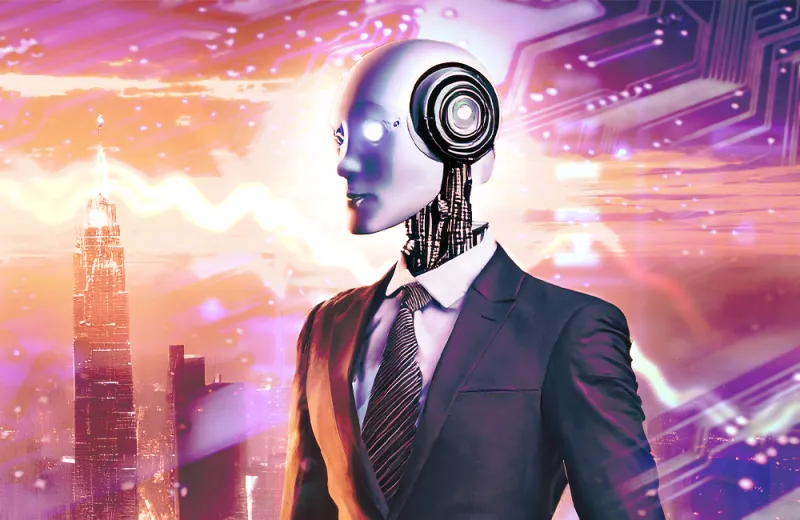As Professor Stephen Hawking once warned, the creation of powerful artificial intelligence will be “either the best, or the worst thing, ever to happen to humanity.” Worse, not long ago, the Economist featured historian and philosopher Yuval Noah Harari who declared that AI “has hacked the operating system of human civilization.” Artificial Intelligence (AI) has become the perfect storm of real potential, hype, and extrapolation.
In the draconian view of some, AI platforms may be engineering their own rise by, among other things, controlling social media narratives, distorting online search results, and exerting control over consumer preference and ultimately, putting humanity on the scrap heap. Under this view, we could be outworked, outsmarted, and replaced by AI.
For now, it is important to think about AI’s effect on investments. The impact of AI is uncertain and subject to conjecture when it comes to market turmoil or investment management. I believe that investment analysis and active management will be hard for AI to replace thanks to the elusive nature of human behavioral shifts, the randomness of market shocks, and the importance of lateral thinking. As evidence, we see that several of the marquee robo-advice providers are scaling back operations in response to lack of demand and investor dissatisfaction with inflexible and cookie-cutter services. AI will perhaps be transformative in a positive way for customer service, efficiency, pricing and eventually, investment returns. But not so far.
But there are risks to financial markets and stability. One key concern we should watch is whether AI platforms will more frequently and rapidly induce “herding” behaviors. In theory, AI generated content will prompt investors to follow the actions of others and thus exacerbate this behavior by amplifying market trends and creating online app-based feedback loops. Much like the panic run on bank deposits at Silicon Valley Bank (SVB), this could lead to market instability and systemic risk.
But it may be premature to conclude that systemically impactful herding caused by AI is an imminent threat. We have been here before. Markets experienced herding and panic-like disruptions during the Covid-19 pandemic with social media fueled day-trading of meme stocks. Likewise, during the March 2023 banking disruptions involving regional banks like SVB, online banking apps and social media alerts resulted in an instantaneous “run” on bank deposits at SVB and elsewhere.
When it comes to herding, we should also be focusing on the monumental concentration and herding that has been overrunning equity markets for years. According to The Wall Street Journal, the number of investors and amount of investment concentrated into broad market index products has become a herd of staggering proportion. Social media influence, trading apps and AI generated prompts may lead to large market concentrations and disruptions but so far, they have been more dramatic than systemic.
Nevertheless, we should not dismiss this mounting concern. We are beginning to understand the high degree of complexity of AI algorithms, and we can only speculate whether a disruption can be diagnosed and neutralized in a timely manner. The potential for a domino effect on the entire financial system may loom. Similar to bank stress tests, we could benefit if regulators had dynamic and tested contingency plans for AI-induced runs. The challenge is that we expect regulators to be prescient, predict how this might happen, and have regulatory solutions in place before problems can manifest themselves. That seems to be wishful thinking.
Let’s not forget that algorithmic screening and modeling have existed for decades. Whether the new AI revolution is any better or worse at creating a trading algorithm than a human cohort of quant trading veterans remains to be seen. Perhaps those same “quants” are ahead of the curve in already migrating to AI tools that improve their analytical stratagem. Whether the trading algorithms generated by AI alone will be different, superior, or more dangerous than hands-on program trading that has existed for decades is unclear. But those employing a time-tested quant strategy based on a combination of science, the latest fintech developments, intuition and feel for markets seem unconvinced that we will see AI dominance in investment management any time soon.
Whether the wider adoption of AI into the investment process will result in broader risks to economic stability is an important question. Regulators and market participants are well advised to avoid playing catch-up on rapidly developing activities and technologies as they were recently required to do with meme stock trading, SPAC proliferation, and social media-induced runs. So too, we have only begun to assess and frame the regulatory response to the technology advancements associated with crypto/digital asset markets. At a minimum, we should expect regulators to monitor the use and application of AI technologies as it relates to known risks including cyber security, data privacy, insider trading and the resiliency of exchanges and central counterparty clearing. For now, civilization and real investment managers will survive.







